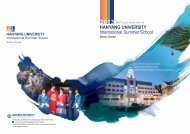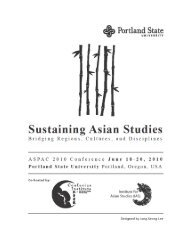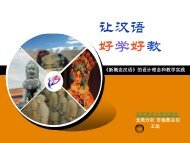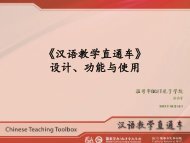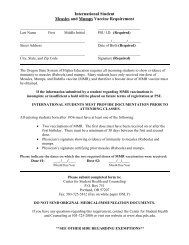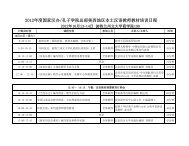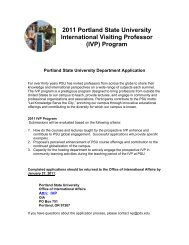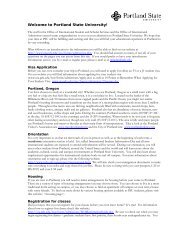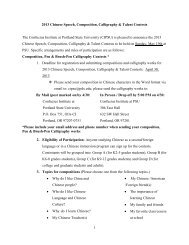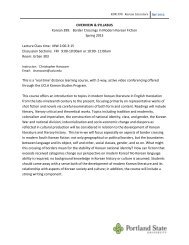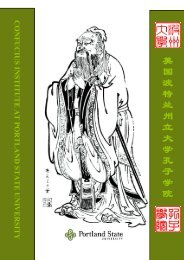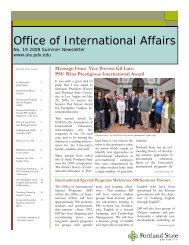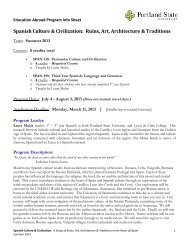ABSTRACTS - oia - Portland State University
ABSTRACTS - oia - Portland State University
ABSTRACTS - oia - Portland State University
You also want an ePaper? Increase the reach of your titles
YUMPU automatically turns print PDFs into web optimized ePapers that Google loves.
ASPAC Conference 2010<br />
June 18 – 20, 2010 | <strong>Portland</strong>, OR<br />
Erin Watters<br />
The Global Citizen Workshop – US/Pakistan: A virtual exchange between American and Pakistani students<br />
The Study: In 2009, Minnehaha Elementary participated in a discovery of Pakistan with a group of students in<br />
Quetta. Even though due to regional armed conflicts in Pakistan it was impossible to complete the actual<br />
exchange with the group in Pakistan, the students in Vancouver, WA, were able to discover many things<br />
about Pakistani students that they had not heard on the news. The experience was a positive one for the<br />
students and we look forward to making more progress in exchanges with Pakistani students and other<br />
regions of the world.<br />
The Context: The Global Citizen Workshop is a month-long series of ½ hour lessons that include a<br />
virtual exchange between groups of youth from different regions of the globe. This exchange gives each<br />
youth an opportunity to build relationships and learn about a new culture. Participants develop a better<br />
understanding about their exchange partners and learn more than they could know of each other through the<br />
media or books. This workshop is developed with the intent to expand a culture of peace encouraging a<br />
continued exchange between participants, respect and hopefully lifelong friendships. This project also<br />
provided opportunities for college students to participate as mentors or facilitators for the youth, providing<br />
practice in facilitation, peace education and educational methods related to technology and linguistics.<br />
~ ~ ~ ~ ~ ~ ~ ~ ~ ~<br />
Peipei Wei<br />
Finding Her "Mi" Hiding behind Fans and Screens--Through Textual Study of Kagero Nikki by Michitsuna's Mother<br />
In retrospect of literary history in Japan there are scattered periods where women's voices came to the<br />
forefront. Aristocratic women's nikki or diary writing practices in the tenth century of Heian Japan are among<br />
one of these periods. Heian nikki writers were already in a well-off social position or mi. However, the<br />
examination of the diary form reveals that high social status does not guarantee feelings of social and<br />
emotional security. This diary genre provides a legitimate medium for us to explore their hidden concerns and<br />
insecurities in a time when social norms prevented them from expressing these concerns publicly. By citing<br />
textual evidences from Kagero nikki written by Michitsuna's mother from three perspectives: self-awareness of<br />
her unsecure mi as well as aspiration to security; vulnerability of her mi; and the attempt of securing her mi<br />
through securing her position in marriage, I conclude that her mi concealed underneath layers of clothing,<br />
covering of fans and screens is actually an insecure one. Although the diary was full of her turmoil and her<br />
insecurities, voicing these concerns actually provided her with some validation and possibility of augmented<br />
her sense of security.<br />
~ ~ ~ ~ ~ ~ ~ ~ ~ ~<br />
Albert Welter<br />
Chan Yulu (Zen Goroku) as a Means of Integration Across Culture: Reflections on the Fictional Background to<br />
Chan/Zen’s Encounter Dialogues<br />
Yulu/goroku (Dialogue Records or Records of Sayings), constitute one of Chan/Zen Buddhism’s original<br />
contributions to East Asian literature. The rise of Chan from an obscure movement to an officially<br />
recognized and dominant form of Buddhism in China provided the foundation for the dispersion of Chan<br />
throughout East Asia, Sŏn in Korea, Thiên in Vietnam, and Zen in Japan. As a result, the yulu literary style<br />
became an integrating component of East Asian Buddhist literature, and it became a normative practice to<br />
compile yulu collections of Chan masters in China, Korea, Vietnam, and Japan. The present study is<br />
concerned with exploring the origins of the yulu genre, particularly as it relates to the employment of fictional<br />
and fictionalized elements in the creation of Chan identity. Important in this regard was the formation of<br />
encounter dialogues, the records of dharma-battles between and among Chan masters and monks over the<br />
true nature of spiritual awakening. Presented as eye witness accounts of the existential revelations of the<br />
mind-nature, these encounters were actually highly contrived and structured literary artifices parading as<br />
actual historical events, filtered through the skilful interpretation of sympathetic literati. Compilers of yulu did<br />
43



